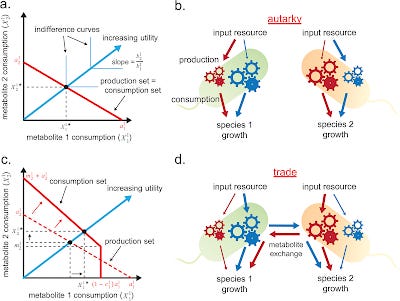Obviously E. coli is a rational utility maximizer

Figure from An Economic Framework of Microbial Trade
I think this paper ("An Economic Framework of Microbial Trade." H/T Mark Thoma) presents a serious challenge to the dominant paradigm of human decision-making in economics (expectations about the future, weighing opportunity costs).
Tom Brown once asked me if my framework would apply to non-human markets. At the time, I didn't have any good examples and so couldn't answer. This paper provides one: a community of E. coli. The mathematical model the researchers set up in the paper is a utility maximizing framework, but generally similar results can be obtained from an entropy maximizing framework.
But E. coli doesn't really plan for the future. It doesn't really make decisions in that would be considered remotely the same as a human deciding between two different brands of bacon. Yet it seems to be effectively rationally maximizing utility. Without a brain.
So maybe, just maybe that whole idea of rational humans maximizing utility saves the phenomena of economic exchange, but doesn't really explain what is going on?



